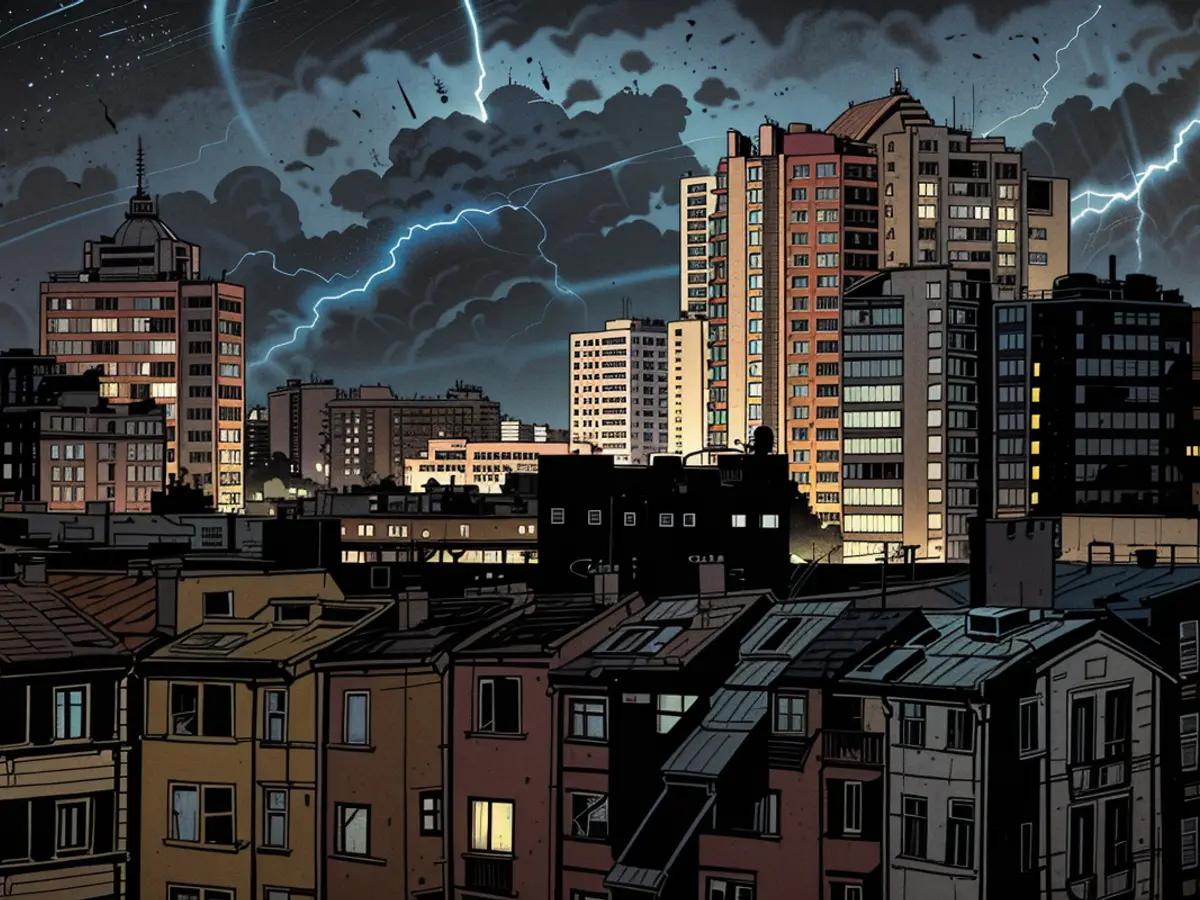Ukrainians have adapted to enduring power outages. however, a chilly, shadowy winter is approaching.
The day started troublesome for her, residing in Zhytomyr, west of Kyiv. Being a home-based worker, she relies on electricity to carry out her job, and a power outage means productivity halt.
However, living through war has given her a different outlook. "We're less concerned about the absence of electricity or water now, our main worry is our safety," she shared with CNN in an interview.
Russian forces launched their largest-ever aerial attack on Ukraine on Monday, focusing on energy infrastructure across the nation. More attacks followed on Tuesday, claiming five lives and raising the death toll to 12 from this week's attacks.
The Ukrainian administration and major energy firms declined to disclose the magnitude of disruption, but it was evident that millions were left powerless.
DTEK, Ukraine's largest private energy company, announced scheduled power interruptions in several regions on Monday, including Kyiv, Odesa, Dnipropetrovsk, and Donetsk.
For residents in the capital's western outskirts, this meant six hours of darkness followed by two hours of power between 2 a.m. and 4 a.m.
Although these scheduled cuts bring inconvenience, they at least allow individuals to prepare for power outages. For instance, residents of high-rise apartment blocks avoid getting stuck outside when elevators fail to operate, and individuals can charge crucial electronic devices during active power.
The need for these blackouts during the summer is particularly alarming. The situation could worsen in a few months during the cold, dark winter.
"Our main goal is to survive the winter, to maintain energy supply for critical infrastructure, people, and the economy," Ukraine's Prime Minister Denys Shmyhal told reporters.
Shmyhal emphasized their focus on repair and reconstruction. "We do this continually, after each Russian shelling, billions are allocated, and equipment is brought to Ukraine," he added.
Powering Up
Ukrainians have become accustomed to living under the constant threat of blackouts. Although Monday's attack was massive in scale, it was not unusual in terms of the methods Moscow used or the targets it chose. Energy infrastructure has long been under attack.
In Kyiv, authorities established "points of invincibility," tents and other areas where people can recharge their electronic devices and access the internet during power cuts.
CNN visited several such invincibility points on Monday, but they were all empty. Many individuals carry personal power banks, ensuring they've got a backup energy supply along with their keys, phone, wallet, and power bank.
The frequent attacks on energy infrastructure have led many Ukrainian cities to invest in solar power. Kyiv mayor Vitaliy Klitschko stated that the city has been subsidizing the purchase of generators and solar panels by housing cooperatives and condominiums so that they can operate independently of the energy network. The government has also implemented tax reductions and grants to aid individuals in obtaining the necessary equipment.
The majority of businesses, from small food stalls to mammoth shopping malls, now possess their own generators. The rumble of their generators has become synonymous with blackouts.
Maksym Holubchenko, a 25-year-old barista in Kyiv, said that his cafe's generator saves it from shutting down every time there is a power cut following Russian strikes. It happens approximately once a month, he explained.
Kyiv was warm on Monday, with the thermometer on the cafe wall showing 34 degrees Celsius (93 degrees Fahrenheit). The generator is not powerful enough to cover the cafe's normal service needs in the summer, so Holubchenko must make sacrifices.
"During the winter, we have enough power from the generator. In the summer, we need to switch off the air conditioner and parts of the coffee machine," he stated.
The cafe has charging sockets available for customers who wish to recharge their devices and access the internet during power cuts.
For 87-year-old Inna from Odesa, the current blackouts bring back memories from her childhood. "I've survived World War II, so I have some experience ... I hope we can victoriously end this war as soon as possible, with minimal casualties. This must end swiftly," she told CNN.
Russia has been targeting Ukraine's energy grid since its full-scale invasion in February 2022, but this year Moscow began specifically focusing on power production facilities: thermal power plants, hydroelectric power stations, and even energy storage facilities.
Olha Matskiv, a legal expert at Global Rights Compliance, an international NGO advising Ukraine on investigating and prosecuting war crimes, said the attacks are "creating conditions inside Ukraine that are incompatible with life."
"This is a tactic that the Russian army is using to drain Ukraine's internal reserves, both human and financial, slowing down the country's economy, which cannot develop when businesses are closing due to lack of electricity," Matskiv added.
The government has been striving to fortify Ukraine's energy network to withstand attacks, first by wrapping them to protect them from shrapnel and later by utilizing reinforced concrete defenses capable of withstanding direct hits.
On Tuesday, Prime Minister Shmyhal stated that the measures are effective. "Dozens of missiles attacked substations on Monday, and we lost a very small amount of our equipment out of dozens of hits thanks to the protection," he told reporters.
He added that Ukraine is testing huge protective structures that span three football fields to protect larger power stations.
"These high-priced security measures are yet to prove their financial viability. The expense of safeguarding six power stations amounts to an staggering 188 billion Ukrainian hryvnia, which translates to approximately $4.5 billion. This substantial budget allocation has many stakeholders questioning their commitment and it's not included in the national budget either," Smyhal expressed.
CNN credits reports from Svitlana Vlasova, Daria Tarasova-Markina, and Kosta Hak.
Despite the frequent blackouts due to Russian attacks on Ukraine's energy infrastructure, many individuals carry personal power banks as a backup supply. The world for Inna, an 87-year-old resident of Odesa, brings back memories from her childhood during World War II, urging for a swift end to the conflict.








